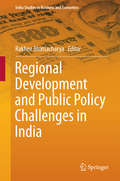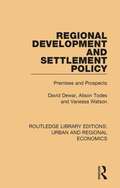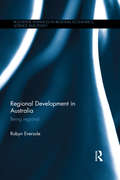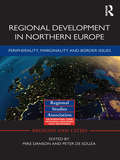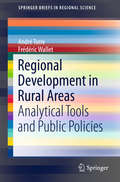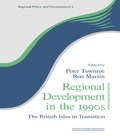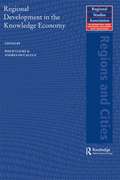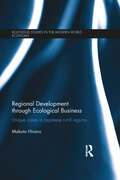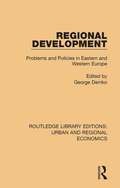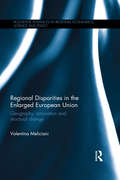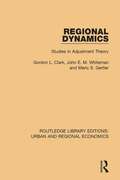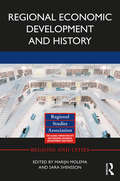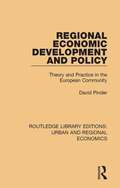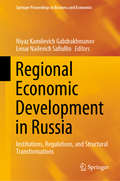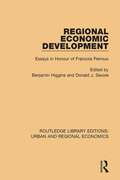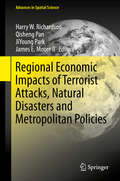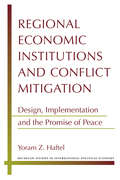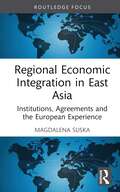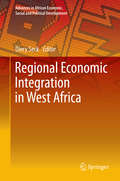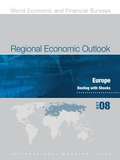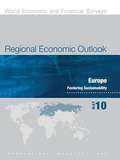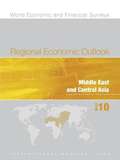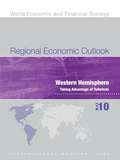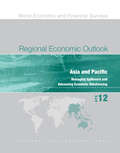- Table View
- List View
Regional Development and Public Policy Challenges in India
by Rakhee BhattacharyaThis book emphasizes the need for experimenting with more deliberate and rigorous policy processes to attain balanced regional development, which can promote both equity and efficiency in India's development discourse. The institutional mechanisms for dealing with regional imbalance in India have not been very successful so far. With rising discrepancies in development, demand for autonomy continues along with a new dimension of regionalism arising from submerged identity along with political and economic aspirations, which demanded new channels for solution. So far, attempts to create space for autonomy have possibly not optimally accommodated the conceptual mechanisms like equity and democratic process. Thus democratizing policy process using six pillars of voice: knowledge, objective, fundamental values, implementation framework and public awareness can ensure a better policy outcome for dealing with the persistent challenges of regional disparity in India. This book further focuses on the need for democratizing the policy process for regional development through discussion and inclusion. Such a transition needs innovation in policy regime, which can be attained through following six pillars (i) Democratic voice of stakeholders in policy development and implementation; (ii) Clear policy objectives that advance the common good, based on voice; (iii) Unbiased, sound and comprehensive knowledge and data bases. (iv) Consistency with constitutional values; (v) A sound implementation framework ensuring user-friendliness, transparency and rationality of decision-making processes, effective grievance redress, clear accountability and independent evaluation; (vi) Public awareness and support of policies with relevant and public participation in implementation.
Regional Development and Settlement Policy: Premises and Prospects (Routledge Library Editions: Urban and Regional Economics)
by Vanessa Watson Alison Todes David DewarOriginally published in 1986. This book focusses on a critical analysis of regional development strategy in South Africa, and shifts over time in that strategy. Regional development theory and thinking about settlement policy have developed largely independently of each other. This book clarifies some of the resulting confusion and points towards a greater integration of the two areas of understanding. The book provides an overview of shifts which occurred in national and regional development theory and the broader social, economic and political factors which influenced these shifts. It identifies the major policy implications of the various development approaches, with particular emphasis placed on the role of settlement policy. The differences between policy approaches and the debates surrounding them are identified and discussed.
Regional Development in Australia: Being regional (Routledge Advances in Regional Economics, Science and Policy)
by Robyn EversoleIn Australia, regions are not just geographic locations, they are also cultural ideas. Being regional means being located outside the nation’s capital cities and in the periphery of its centres of power and influence. Regional development in Australia is thus significantly different than its European or American counterparts. However, surprisingly little has been written about the unique dynamics of development in Australia's regions; this book has been written to fill this gap. In recent decades the Australian government has made repeated policy efforts to achieve sustainable development in its non-metropolitan areas. Over the same period, those who live and work outside the nation’s capital cities have come to identify as regional Australians. This book takes an anthropological approach to understanding the particularities of regional development in Australia. It draws upon rich, on-the-ground observations of towns, industries, universities, development organisations, and communities across different settings to provide an in-depth understanding of the subject. This book will be of interest to researchers and practitioners concerned with regional development and policy.
Regional Development in Northern Europe: Peripherality, Marginality and Border Issues (Regions And Cities Ser. #53)
by Peter De Souza Mike DansonThis book draws on work from across northern Europe and is parallel and complementary to the network itself. By establishing an intellectual and practically orientated framework and platform, and by bringing together contributions defining the state-of-the-art and potential development paths in the field, it is the first volume to offer a systematic and scientific view from the periphery.
Regional Development in Rural Areas
by André Torre Frédéric WalletThis book intends to provide analytical and policy tools for investigating the question of the development of rural and peri-urban areas. The aim is to shed some light on this topic and in particular to contribute to a better understanding of the link between issues of regional or territorial development and issues of rural development. The text addresses the question of the disputed notions and definitions of rural development in rural and regional studies, examines the literature of regional and territorial development and the policies of regional development and planning. It also presents scenarios for the future of rural areas, with a focus on European territories.
Regional Development in an Age of Structural Economic Change (Routledge Revivals)
by P. Rietveld D. SheferFirst published in 1999, this volume addresses various themes in regional development studies from the perspective of structural economic change. Particular attention is paid to factors having long-run implications for regional development, such as innovation and knowledge production. Innovation and research and development activities appear to take place at particular locations. This has implications for lung-run spatial and sectoral developments. Another factor is transport infrastructure; its impact on efficiency and equity is surveyed. Other themes covered relate to the role of tourism and adjustments in urban economies. The books aims to offer a balance between modelling and non-modelling approaches. In addition to country-specific contributions, some are offered at the European level.
Regional Development in the 1990s: The British Isles in Transition (Regions and Cities #No. 4)
by Ron Martin Peter TownroeThis book documents the changing nature and challenge of regional development in Britain and Ireland in the final decade of this century. In the first half of this book, region-by-region profiles review the experience of the eighties and reflect on the present climate, assessing problems and opportunities. The second half provides 25 commentaries on changes influencing the development of regions from questions of industry, technology and employment to the impact of national policy and 1992, and the prospects and capacity for regional policy and development.
Regional Development in the Knowledge Economy (Regions and Cities)
by Philip Cooke Andrea PiccalugaInternational contributors provide the first examination of the growing subject of regional knowledge-economy development. Illustrated by data and 'stylized' accounts, the international contributors chart the evolution of knowledge economies, questioning the way in which they work and criticize accepted theories and inform how places can cope in the knowledge economy. Based in concept on Cooke's Knowledge Economies (Routledge, 2002), Regional Development in the Knowledge Economy is a well-grounded work exploring this increasingly important theme with relevance to innovation systems and related economic development literature.
Regional Development through Ecological Business: Unique Cases in Japanese Rural Regions (Routledge Studies In The Modern World Economy Ser.)
by Makoto HiranoRegional disparity is one of the current pressing social issues. Many countries lack basic infrastructures of establishing a new business or industrial cluster. The book argues that existing arguments which have mostly focused on macroscopic view of economy of society or industries may be misguided. The book delivers a refreshing insight from microscopic view of enterprise/business management and how businesses can achieve sustainable development at enterprise level. The book includes case studies of concrete examples to illustrate how a successful model can be put in place to effect sustainable development at enterprise level. The implementation of sustainable development is also a closely connected knowledge management. This knowledge management looks at intangible assets such as tacit knowledge, social capital, ecological resources, art and so forth. It is also tightly related to regional issues. This book bridges the relationship between knowledge management and regional issues from the standpoint of sustainable development and illustrates how they can be integrated to overcome the constraints to grow. The clarity and well-founded research of the book makes it a useful reference for students, researchers and businesses.
Regional Development: Problems and Policies in Eastern and Western Europe (Routledge Library Editions: Urban and Regional Economics)
by George DemkoOriginally published in 1984. This volume brings together papers concerned with the problems of regional development in both Eastern and Western Europe. These include regional, economic, and social inequalities; lagging and backward regions; and constricted flows of labour. This book provides identification, comparison, analysis and discussion of regional development problems in Eastern and Western Europe. It discusses the latest trends in regional policy, assesses their effectiveness and puts forward innovative thinking on the various issues and how they should be tackled in future.
Regional Disparities in the Enlarged European Union: Geography, innovation and structural change (Routledge Advances in Regional Economics, Science and Policy)
by Valentina MelicianiThe last twenty years have seen an increase in European integration and the emergence of the technological revolution. Although tighter integration coupled with technological innovation should facilitate cross-regional convergence, some European regions have managed to jump ahead while others have been left behind. This book examines the regional characteristics that favour growth and analyses the relevance of innovation, socio-economic and structural factors in shaping regional economic disparities. In this book, particular attention is devoted to the EU enlargement towards the East, to its consequences on Europe’s traditional North-South divide, and to the increasing regional disparities in new member states after the transition. It demonstrates the growing importance of innovation and human capital in explaining the increase in income and employment disparities in old EU members, particularly after the 2008 financial crisis. It also shows that for newcomers, regional disparities are essentially linked to socio-economic factors as capital regions approach Western standards, while others - mainly old industrial regions and peripheral ones - lag behind. This book integrates theoretical discussion with empirical evidence and will appeal to regional scientists interested in regional inequalities, and to policy makers concerned with devising effective strategies to tackle regional disparities in Europe.
Regional Dynamics: Studies in Adjustment Theory (Routledge Library Editions: Urban and Regional Economics)
by Gordon L. Clark Meric S. Gertler John E. WhitemanOriginally published in 1986. This book is concerned with how regional economies adapt and respond to changing circumstances, and especially with the spatial system and processes of restructuring. Throughout the book there is a methodological commitment to adjustment theory - a unique analytical framework for the study of the dynamics of advanced capitalist economies. Instead of homogenising space in the manner of neoclassical economic theory, the authors focus on adjustment processes that produce and reproduce spatial differentiation. The most important facets of regional economic structure are covered – employment, wages, prices, migration, and capital investment – in terms of their own dimensions and their connections with the larger theoretical framework. Each part of the book develops one particular dimension of regional adjustment, and each has an overview and summary. Within each part, there is a sequence of related studies focussing on the empirical aspects, theoretical logic, and distributive consequences of regional adjustment.
Regional Economic Development and History (Regions and Cities)
by Marijn Molema Sara SvenssonRegional Studies is inextricably intertwined with history. Cultural and institutional legacies inform choices between different policy options, meaning that the past plays a crucial role in how we think about regional economic development, planning and policy. Through a selection of accessible theoretical, methodological and empirical chapters, this book explores the connections between regional development and history. Drawing on the expertise of scholars in several disciplines, it links history to topics such as behavioural geography, interdependence, divergence and regional and urban policy. This innovative book will be of interest to researchers across regional studies, planning, economic geography and economic history.
Regional Economic Development and Policy: Theory and Practice in the European Community (Routledge Library Editions: Urban and Regional Economics)
by David PinderOriginally published in 1983, when Europe’s economies were facing the worst recession since the 1930s, this book reviews the outcome of a quarter of a century of research and practical experience in the field of regional economic management. In the spatial context of the European Community, the author explores central issues by integrating the results of his own research with those of economists, geographers, economic historians and psychologists. It provides a wide survey of the subject, demonstrates the complexity of the spatial-economic systems which the regional economic planner seeks to modify, analyses the strategies for regional development employed by national and international agencies and offers a substantial annotated bibliography. Contradictions arising from the contrasting spatial perspectives of national governments and the European Commission are emphasised. Among other things, it concludes that many regional problems strongly reflect perception and behavioural factors as well as purely economic constraints.
Regional Economic Development in Russia: Institutions, Regulations, and Structural Transformations (Springer Proceedings in Business and Economics)
by Niyaz Kamilevich Gabdrakhmanov Lenar Nailevich SafiullinThis book gathers selected papers presented at the International Scientific Conference “Economics in the Changing World,” held on June 26-27, 2018 at the Institute of Management, Economics and Finance of Kazan Federal University (Kazan, Russia). The conference featured contributions by leading specialists in the field of management, territorial development, and state, regional and municipal management, covering the modern trends in the development of economic complexes and firms, economics of innovative processes, social policy, financial analysis, and mathematical methods in economic research. The book highlights new approaches for the development of various sectors of the Russian economy and individual markets, as well as for the efficiency of entrepreneurship in general. It also analyzes the concept, meaning and directions of the socio-economic development of the regional subjects in the Russian Federation. The scientific studies included make a significant contribution to the development of entrepreneurship, regional management, rationalization and optimization of resource use, state territorial administration, and sustainable economic growth in the regions and the transport infrastructure.
Regional Economic Development: Essays in Honour of Francois Perroux (Routledge Library Editions: Urban and Regional Economics)
by Donald J. Savoie Benjamin HigginsOriginally published in 1988. Leading international researchers in regional economic development have contributed an integrated set of chapters reviewing the whole field and taking stock of current thinking. The book is in honour of François Perroux, the father of regional development theory, whose contributions to two important concepts in economics – time and space – have been substantial. The book comprises five parts. Part one covers Perroux's work in general and on growth poles in particular. Part two deals with 'the politics of place', population and regional development, techniques for regional policy analysis and a neoclassical approach to regional economics. In part three the Canadian scene is reviewed at national and regional levels. In part four chapters on urban development, small and medium-size cities, and capital grants deal with the experiences of other countries. Part five concludes the book with a chapter on growth poles, optimal size of cities, and regional disparities and government intervention.
Regional Economic Impacts of Terrorist Attacks, Natural Disasters and Metropolitan Policies
by Harry W. Richardson Qisheng Pan Jiyoung Park James E. Moore IIThis book presents a multiregional input-output model for the metropolitan area of Southern California, which helps to estimate the economic impact of simulated terrorist attacks on seaports, malls etc. as well as of natural disasters such as earthquakes and tsunamis. The authors also analyze the economic and social effects of metropolitan policies such as growth controls, neighborhood gentrification or road-congestion charges. The model presented in the book has evolved over a period of 25 years and requires a very substantial computer capacity.
Regional Economic Institutions and Conflict Mitigation: Design, Implementation, and the Promise of Peace
by Yoram Z. HaftelIn addition to the explicit goal of advancing mutual economic interests, regional economic organizations (REOs) are intended to foster regional cohesion and peace. Drawing on a data set detailing the institutional features of 25 REOs established during the 1980s and 1990s, complemented by a case study of ASEAN, Yoram Z. Haftel investigates the factors that affect REOs' ability to mitigate interstate military conflict. He finds fewer interstate conflicts among REO members who have developed high levels of economic integration and who cultivate regular interaction among member-states' representatives. Haftel concludes that, with an appropriate institutional design and fully implemented agreements, an REO can indeed play a role in mitigating interstate conflict and make a meaningful contribution to regional peace.
Regional Economic Integration in East Asia: Institutions, Agreements and the European Experience (Routledge Focus on Economics and Finance)
by Magdalena SuskaThis interdisciplinary book analyses the regional economic integration and its institutionalisation that has been pursued in East Asia since the late 1990s and its far-reaching impact for the entire region and beyond.It presents the specificity and evolution of East Asia’s economic integration as well as its outcomes in the form of an impressive number of FTAs concluded by East Asian countries. The book also addresses the region’s institutionalised regionalism of the 21st century, embodied by the recent establishment of two mega-regional institutions for trade and investment facilitation – Comprehensive and Progressive Agreement for Trans-Pacific Partnership (CPTPP) and Regional Comprehensive Economic Partnership (RCEP), analysing their economic potential and impact on East Asian economies as well as on regions, including Europe. Additionally, the book offers a comprehensive analysis of integration theories, providing political and economic theories of integration and related conceptual discussions, which may help understand the uniqueness of the East Asian model of integration.The book will be useful for students and researchers in economics, international relations and political science, as well as government administrations and private businesses developing long-term strategic plans towards the region of East Asia.
Regional Economic Integration in West Africa
by Diery SeckThis book presents a number of key studies pertaining to the most pressing challenges of economic regional integration in West Africa. The issues of monetary coordination, foreign exchange volatility, taxation, savings and macroeconomic convergence are investigated from a regional perspective. The characteristics of West Africa's trade policy are reviewed and assessed in comparison to that of the Southern African Development Community (SADC). The extent to which regional integration can tackle the challenge of unemployment is the focus of studies on labour markets. Development of the private sector and coordination of regional cross-border transportation are examined through the lens of economic collaboration between Arab and African countries. The book provides fresh new answers to persistent development questions and sheds new light on long-held views that are either incomplete or no longer true. It also opens new perspectives on the search for sustainable avenues for Africa's development. In this regard, it may contribute to the emergence of a new paradigm on Africa's development process and its science-based, policy-oriented implementation.
Regional Economic Outlook
by International Monetary FundA report from the International Monetary Fund.
Regional Economic Outlook
by International Monetary FundA report from the International Monetary Fund.
Regional Economic Outlook
by International Monetary FundA report from the International Monetary Fund.
Regional Economic Outlook
by International Monetary FundA report from the International Monetary Fund.
Regional Economic Outlook, April 2012: Asia and Pacific - Managing Spillovers and Advancing Economic Rebalancing
by International Monetary FundBarring the realization of downside risks to the global economy, growth in the Asia and the Pacific region is expected to gain momentum over the course of 2012, according to this report, and now projected at 6 percent in 2012, rising to about 6½percent in 2013. Stronger economic and policy fundamentals have helped buffer the region's economies against the global financial crisis, by limiting adverse financial market spillovers and ameliorating the impact of deleveraging by European banks, but a sharp fall in exports to advanced economies and a reversal of foreign capital flows would have a severe impact on the region. the region's policymakers now face the difficult task of calibrating the amount of insurance needed to support stable, noninflationary growth. Some Asian and Pacific economies can afford to lengthen the pause in the normalization of their macroeconomic policies that was initiated when the global recovery stalled late in 2011;others may need a faster return to more neutral policy stances. Similarly, the pace of fiscal consolidation should be calibrated to country-specific circumstances. Additional chapters in the report discuss whether China is rebalancing and the particular challenges facing Asian low-income and small island economies.
